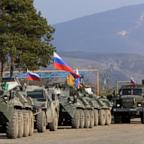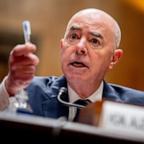Exclusive: Cheney Holds Hard-Line Stance
VP Cheney discusses torture, defends administration decision to go to war.
Dec. 15, 2008 — -- In an exclusive interview Monday with ABC News, Vice President Dick Cheney issued an unapologetic defense of the Bush administration's anti-terror policies, including the use of waterboarding, and said the prison at Guantanamo Bay should remain open as long as there's a war on terror.
In his first exit interview and first television interview since the November election, Cheney held fast to his views on coercing information out of alleged terrorists, saying waterboarding was an appropriate means of getting information from Khalid Sheikh Mohammed, the alleged mastermind behind the Sept. 11 terrorist attacks.
Cheney resisted those who say the Bush administration has overstepped its bounds on torture, saying national intelligence is an art, not a science.
"On the question of so-called torture, we don't do torture," Cheney told ABC News. "We never have. It's not something that this administration subscribes to.
"I think those who allege that we've been involved in torture, or that somehow we violated the Constitution or laws with the terrorist surveillance program, simply don't know what they're talking about."
Cheney was also asked whether he authorized the tactics used against Khalid Sheikh Mohammed.
"I was aware of the program, certainly, and involved in helping get the process cleared, as the agency in effect came in and wanted to know what they could and couldn't do," Cheney said. "And they talked to me, as well as others, to explain what they wanted to do. And I supported it."
"There was a period of time there, three or four years ago, when about half of everything we knew about al Qaeda came from that one source," he added. "So, it's been a remarkably successful effort. I think the results speak for themselves."
Cheney also said the Sept. 11 terrorist attacks most certainly became "a prime motivation" in shaping his time in office.
"Have I changed?" Cheney asked. "Well, not in the sense that I've gone through some fundamental psychological transition here but I have been since that day focused very much on what we needed to do to defend the nation and I think the policies we've recommended, the programs that we've undertaken have been good program. I think those have been sound decisions and if that's what they mean by saying I've changed, I'm guilty."
The outgoing vice president also disputed former Bush adviser Karl Rove's recent comments about the decision to go to war in Iraq.
While discussing Bush's legacy earlier this month, Rove said he did not believe the administration would have gone to war had intelligence revealed Saddam Hussein did not possess weapons of mass destruction.
"I disagree with that," Cheney said Monday. "As I look at the intelligence with respect to Iraq, what they got wrong was that there weren't any stockpiles."
"What they found was that Saddam Hussein still had the capability to produce weapons of mass destruction. He had the technology, he had the people, he had the basic feed stock."Cheney added that, given Saddam Hussein's capabilities, reputation and track record of brutality, "this was a bad actor and the country's better off, the world's better off with Saddam gone, and I think we made the right decision in spite of the fact that the original NIE was off in some of its major judgments."




